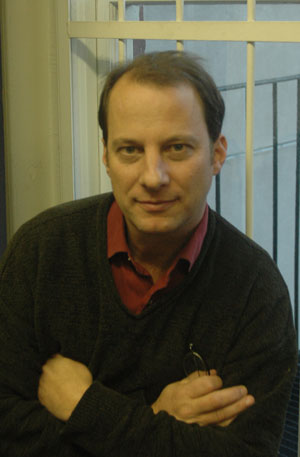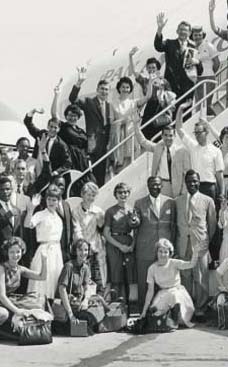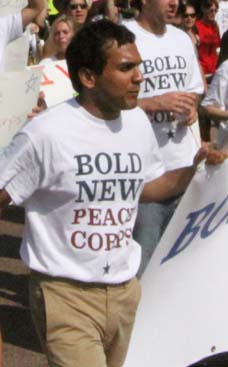
George Packer travels to Togo in 1982 to fulfill John F. Kennedy's eerily familiar call to service: "Ask not what your country can do for you ask what you can do for your country." In the spring of 1982, George Packer, then a senior at Yale University, receives a letter from the U.S. Peace Corps with instructions to leave for Togo in three weeks. In Packer's own words, he has to consult a map shortly thereafter because he has never heard of this small African nation. Packer arrives in Togo Etienne Gnassingbe Eyadema's Togo, to be precise a few months later to carry out his duty: he would teach English to elementary school pupils in a small town called Lavie, perhaps a contraction of "Lala vie," which means "wait a little longer." The Village of Waiting is a culmination of Packer's experiences in Togo: suffocating penury, fear and mistrust of government by the hoi polloi, Eyadema's tyrannical rule, ethnocentrism, despair, and the interminable wait by citizens for their nation's socioeconomic transformation. Lavie is symbolic of Africa's struggles. And the notion that Africa must "wait a little longer" is as regrettable as it is frightening. George Packer reminds us about Africa's seemingly intractable problems penury, indecision, political instability, ethnocentrism, despair but will Africans learn any lessons from this Yale University-educated writer's observations? Will Africans continue to "wait a little longer" while other regions of the world march on unequivocally to new economic and technological heights? Will Africa break off the manacles of underdevelopment and greed? Will new and selfless leaders emerge to transform the continent's socioeconomic stagnation to one of hope, bliss and positive action for the present generation and posterity? Only time will tell.
Daniel K. Pryce writes: George Packer's The Village of Waiting: A Microcosmic Vista of Africa's Socioeconomic Aridity
The Village of Waiting: A Microcosmic Vista of Africa's Socioeconomic Aridity
Last Updated: Wednesday, 1 December 2010, 3:21 GMT
By Daniel K. Pryce
George Packer travels to Togo in 1982 to fulfill John F. Kennedy's eerily familiar call to service: "Ask not what your country can do for you ask what you can do for your country." In the spring of 1982, George Packer, then a senior at Yale University, receives a letter from the U.S. Peace Corps with instructions to leave for Togo in three weeks. In Packer's own words, he has to consult a map shortly thereafter because he has never heard of this small African nation. Packer arrives in Togo Etienne Gnassingbe Eyadema's Togo, to be precise a few months later to carry out his duty: he would teach English to elementary school pupils in a small town called Lavie, perhaps a contraction of "Lala vie," which means "wait a little longer." The Village of Waiting is a culmination of Packer's experiences in Togo: suffocating penury, fear and mistrust of government by the hoi polloi, Eyadema's tyrannical rule, ethnocentrism, despair, and the interminable wait by citizens for their nation's socioeconomic transformation.
Shortly after arriving in Lome, Packer is introduced to the word "yovo," a derivative of "yevu," a derivative of "aye avu," which means "cunning dog." So, the white man is a cunning dog? Packer does not like the term one bit. He quickly finds out that the opposite of "yovo" is "ameyibo," a term he uses in retaliatory fashion whenever he is called "yovo" by one of the locals. Packer's plea that he has a real name and that he detests the name "yovo" is almost always ignored. Packer tells us, as he waits in Lome for his deployment to Lavie, that "Yovos typically like to get things done and to master their situation." The preceding is not particularly surprising, as most Westerners who write about Africa are unable to hide their condescension toward the black man and his pervasive penury and perpetual retrogression although Packer deserves credit for being more cautious in his condemnation of Africa's ills than other writers of his ilk.
George Packer receives several cultural lessons in his early days in Togo: chiefs typically have more than one wife; the deaths of chiefs are not announced for at least one year; no whistling after dark, to avoid attracting evil spirits; no pounding of manioc or yams after nightfall; and no eating with the left hand, as its primary, not-so-noble duty is to take care of what exits the alimentary canal. The locals are required to obey these customs; the visitors the Americans are expected to do the same.
When Packer arrives in Lavie, he is hosted by the Agbeli family: husband, wife and eight children. Packer soon discovers that "Agbeli" means two things: "there is life" and "manioc." At one time, Packer tests his knowledge of Ewe, "Agbeli le agbeli dum," scilicet, "Agbeli is eating agbeli (manioc)." Packer tells the reader: "Ewe, like Chinese, is a tonal language to me it always sounded like a workingman's opera, music from the gullet and one syllable, given ten inflections, can have ten different meanings."
In a strange way, Packer finds Christine, Mr. Agbeli's wife, quite attractive; he describes her physical attributes consistently throughout the book. One moonlit night, Packer, on his way out of the house, inadvertently catches the curvy silhouette of Christine while she takes a bath outside. Packer is immediately reminded about Christine's gorgeous features: slim body; smooth skin; high cheek bones, like an Asian's; taut arms. Desire, like an electric current, rises in Packer. He rebukes the illicit thought. He has to. Nothing is ever said about the incident. Nevertheless, Packer believes that Christine shares his feelings in a telepathic way. Of course, Christine and Packer are aware of the fact that a liaison, or tryst, would certainly endanger both their lives they never explore their admiration for each other beyond words of comfort and encouragement, which Christine certainly needs and appreciates because of her appallingly subservient role in the marriage.
In Lavie, Packer gets the opportunity to taste locally distilled dry gin and it causes the world around him to spin uncontrollably. The people of Lavie call this powerful drink kpetessie. Many Ghanaians call it akpeteshie. Faustus, a local man with a distillery in the bush, tells Packer how kpetessie got its other name: sodabi. Now, most Ewes would be familiar with the term "sodabi." Faustus gives George Packer a history lesson: A "white man from Ghana came here. He was English and when the Ewe gave him some s.d.b. (kpetessie) to drink he made a face and said in his own English, So dat be. So dat be.' These Ewes never heard any English before. And afterward, they always call it sodabi.'"
Togo's educational system, according to Packer, suffers from rigidity and a suffocating bureaucracy, twin calamities that tend to destroy the academic dreams of pupils. For an educational system that employs teachers based more on their ethnicities than their academic prowess, the pupils are always the victims of such a deplorable system. Under such nauseating circumstances, one may expect only a handful of pupils to make the grade from elementary school to secondary school, and the numbers actually get smaller for those leaving secondary school for the university. And even those who make it to the university would be lucky to find jobs after graduation, as those in authority are usually afraid to give opportunities to young, college-educated people, for fear they the folks in authority will be replaced.
One of Packer's frustrations at Lavie is the rampant use of corporal punishment by teachers. Packer soon discovers that the problem is endemic it is a tool teachers employ throughout Togo to, ostensibly, instill discipline in their pupils. Of course, corporal punishment, as a disciplinary tool, is clearly abused by teachers. And when Packer refuses to discipline his pupils in this abusive manner, he receives an extensive "lecture" from other staff members about the efficacy of the cane. Packer is not amused. The paradox of Togo's crumbling educational system, Packer observes, is the fact that the teachers responsible for imparting knowledge to these children would rather turn these kids into farmhands than spend adequate time and effort imparting knowledge to them. The free child labor that the teachers have come to depend upon is a clear violation of these pupils' rights. And with most parents too poor and too busy eking out a living to protest the abuse, the rot simply has become the norm.
In 1982 when Packer arrives in Togo, there are many dictators in Africa: it is the trend. Packer recalls how, in 1963, President Sylvanus Olympio, an Ewe from Anecho, the man who leads Togo to independence, is brutally murdered by Etienne Gnassingbe Eyadema. This poignant event crystallizes the mistrust between the Kabye, Eyadema's tribe, and the Ewe. The story is the same in many African countries: the pervasiveness of tribal conflict and mistrust. Prior to assassinating Olympio, Eyadema and his acolytes accuse the president of being more interested in a "pan-Ewe" ideology that will reunite the Ewe cousins of Ghana and Togo than in the unity of the people of Togo. There is a contemporaneous event: Hundreds of Kabye soldiers, among them Gnassingbe Eyadema, return from the Algerian War, but they receive no formal recognition and are also refused a place in the Togolese army. This is the final straw. The sitting president is murdered shortly thereafter. The Kabye-Ewe schism is no longer mere rhetoric.
Nothing has changed in contemporary Togo, because an Eyadema has simply taken the place of another a dead one and the Olympios are still personae non gratae in their own homeland. That is Togo's story. That is Africa's story. Like the people of Lavie, Africans are still waiting for the light at the end of the tunnel of despair, deprivation and socioeconomic aridity.
When Olympio becomes the victim of Africa's first military takeover, the stage is set for others to copy this dastardly act. Soon, African dictators' brutality is surpassed only by their desire to live. And African dictators would learn the secrets of political longevity: "to put survival before anything, to count on force, to take nothing for granted." Africa's many problems could be traced to the brutality of one insurrection after another, each junta crueler than the previous one in order to instill fear in would-be putschists. And the vicious cycle continues for a few more decades until the gentle waters of democracy begin to put out the flames of tyranny on the continent. Today, the embers of tyranny are dying out on the continent. A portent of better days ahead?
Lavie is symbolic of Africa's struggles. And the notion that Africa must "wait a little longer" is as regrettable as it is frightening. George Packer reminds us about Africa's seemingly intractable problems penury, indecision, political instability, ethnocentrism, despair but will Africans learn any lessons from this Yale University-educated writer's observations? Will Africans continue to "wait a little longer" while other regions of the world march on unequivocally to new economic and technological heights? Will Africa break off the manacles of underdevelopment and greed? Will new and selfless leaders emerge to transform the continent's socioeconomic stagnation to one of hope, bliss and positive action for the present generation and posterity? Only time will tell.
I strongly recommend this book to my readers, as it is a masterpiece by a Westerner on Africa.
[The writer, Daniel K. Pryce, begins his doctorate in Criminology, Law and Society at George Mason University in January 2011. He holds a master's degree in public administration from the same university. He is a member of the national honor society for public affairs and administration in the U.S.A. He can be reached at dpryce@cox.net.]















